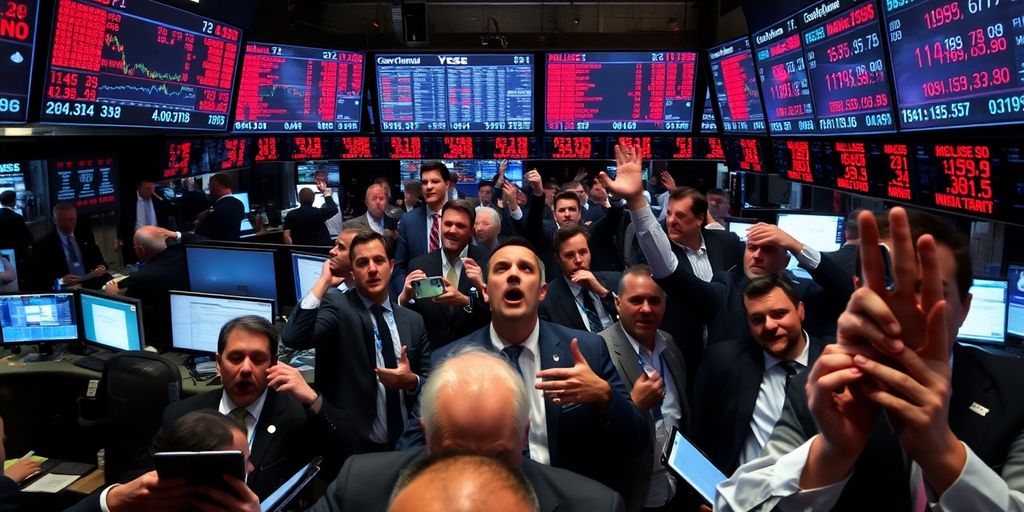Business
Dow Jones Faces Historic Plunge Amid Escalating Tariff Crisis

The Dow Jones Industrial Average experienced a staggering drop of 2,200 points on April 4, 2025, marking one of the most significant declines in its history. This plunge was triggered by escalating tensions between the United States and China over tariffs, leading to fears of a global economic downturn.
Key Takeaways
- The Dow fell by 2,231 points, or 5.5%, entering correction territory.
- The S&P 500 and Nasdaq also saw significant declines, with losses of 5.97% and 5.82%, respectively.
- The market’s volatility reflects investor anxiety over potential recession risks due to trade tensions.
Market Reaction to Tariff Escalation
The sharp decline in the stock market was primarily driven by China’s announcement of retaliatory tariffs on U.S. goods, which are set to take effect on April 10. This move escalates the ongoing trade war that has been intensifying since President Trump took office for a second term in January.
- Tariff Details: China will impose a 34% tariff on all U.S. imports, significantly impacting various sectors.
- Previous Tariff Increases: In February, Trump had already increased tariffs on Chinese goods to 10%, which were then doubled to 20% in March.
Economic Implications
Analysts are warning that the current trade war could lead to a recession, with JPMorgan estimating a 60% chance of economic contraction in the U.S. and globally. The Federal Reserve has expressed concerns about the inflationary effects of these tariffs, which could hinder economic growth.
- Market Value Loss: The S&P 500 lost approximately $5.06 trillion in market value over just two days.
- Investor Sentiment: The Cboe Volatility Index (VIX), often referred to as the market’s fear gauge, surged by 50%, indicating heightened anxiety among investors.
Sector-Specific Impacts
The technology sector was particularly hard hit, with major companies like Apple and Nvidia experiencing significant stock price declines. Investors are increasingly wary of companies that rely heavily on international supply chains, fearing that tariffs will lead to increased costs and reduced profits.
- Apple: Shares fell by over 9% in the days leading up to the market crash.
- Nvidia: The company warned of a $5.5 billion charge due to export restrictions, further exacerbating market fears.
Global Market Reactions
The turmoil in the U.S. stock market had a ripple effect across global markets, with European indices like the STOXX 600 and FTSE 100 also experiencing their largest single-day declines since 2020. Asian markets, including Japan’s Nikkei 225, followed suit with significant losses.
- European Markets: The STOXX 600 index dropped by 5.12%, while the FTSE 100 fell by 4.95%.
- Asian Markets: Japan’s Nikkei 225 index fell by 2.75% after a previous decline of 2.77%.
Conclusion
The recent market turmoil underscores the fragility of the global economy amid rising trade tensions. As investors brace for further developments, the potential for a prolonged trade war raises concerns about economic stability and growth prospects in the coming months. The situation remains fluid, and market participants will be closely monitoring any new developments regarding U.S.-China trade relations.
Sources
- Stock Market on April 4, 2025: Dow plunges 2,231 points into correction territory while Nasdaq enters bear
market; S&P 500 books biggest weekly drop since 2020 as China retaliates on tariffs.<!– –> –
MarketWatch, MarketWatch. - Dow plunges 2,200 points as tariff tumult rocks markets, CNN.
- Dow drops nearly 700 points, Nasdaq tumbles 3% in tech-driven sell-off, CNBC TV18.
-

 Press Release4 days ago
Press Release4 days agoClinical Trials Market Set for Robust Growth, Driven by Drug Development Surge and Digital Innovation
-

 Press Release7 days ago
Press Release7 days agoBellarium ($BEL) Price Prediction: Could It Hit $5 by 2026?
-

 Business6 days ago
Business6 days agoHow Managed IT Solutions Help Small Teams Compete at Enterprise Scale
-

 Press Release5 days ago
Press Release5 days agoIndustrial Boiler Market Expected to Surpass USD 24.4 Billion by 2035 Amid Growing Demand for Energy Efficiency and Industrialization
-

 Press Release5 days ago
Press Release5 days agoGreen Bio Chemicals Market Poised for Sustainable Growth amidst Global Shift to Eco-Friendly Alternatives by 2035
-

 Press Release5 days ago
Press Release5 days agoFill-Finish Pharmaceutical Contract Manufacturing Market Expected to Flourish Amid Biopharmaceutical Boom and Global Outsourcing Trend by 2035
-

 Press Release5 days ago
Press Release5 days agoPreventive Vaccines Market to Witness Strong Growth by 2035
-

 Press Release5 days ago
Press Release5 days agoPet Food Nutraceutical Market Set for Robust Expansion Amid Rising Demand for Pet Wellness by 2035










